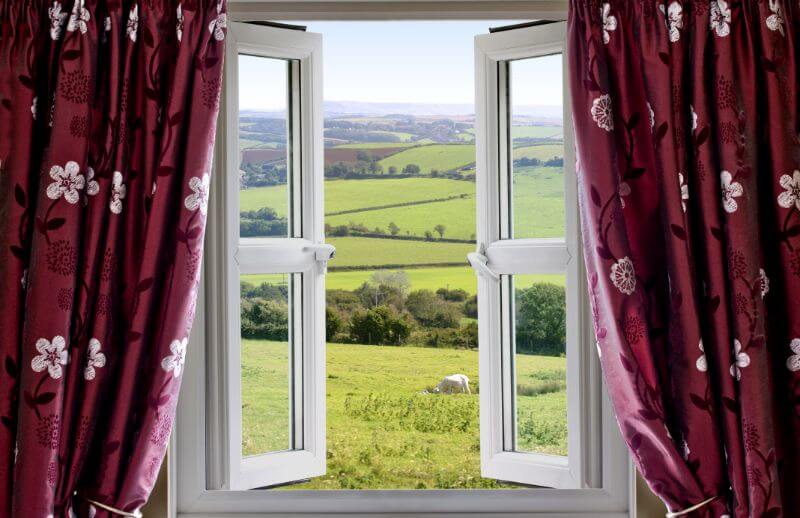Double glazed windows consist of two panes of glass with a gap in between. An odourless and non-toxic insulating gas fills the gap. Cold air cools the outside pane and is transferred to the gap. As gas is heavier than air it slows the transfer of cold air to the inner pane. This also works the other way by retaining the warmer air inside.
The glass panes are fitted into a frame or IGU (integrated glass unit). The frames can be made of timber, aluminium or uPVC according to your preference, and are securely sealed to prevent air circulation to reduces heat transfer.

Benefits of Double Glazing
Reducing heat loss is the obvious benefit but there are several others.
- Reduces energy bills: around 10% of heat is lost through windows and that adds up to several hundred pounds a year in unnecessary bills.
- Reduces noise pollution: sound travels in waves, which creates energy. The gas absorbs some of the energy to reduce the sound wave and lower noise levels.
- Extra Security: two panes are harder to break than one. Often intruders can only break the outer pane. Toughened or laminated glass are also options for added security.
- Reduces Condensation: your home is full of water droplets from cooking, washing, and even breathing. Condensation and unhealthy mould can be the result. As the internal pane of an IGU is near to room temperature this greatly reduces the build-up of water vapour and condensation.
- Added Value: if you’re thinking of selling, quality double glazing is a big plus point for potential buyers, and this gives you the chance to get the best price.
How Much Does Double Glazing Cost?
Costs will vary, depending on size, materials, number of windows and design. As a general guide, you should expect to pay around a minimum of £200 per window and £3,000 plus for a whole house (based on a 3-bed semi).
How Long Do Double Glazed Windows Last?
This can be anything from 10 to 35 years, depending on the quality of materials and workmanship. At the Window Centre, all double-glazing products come with a 10-year guarantee.
How to Deal with Condensation
Even top-quality windows will suffer from condensation at some point. The damp UK weather makes this unavoidable, but it can be kept to a minimum.
Improved air circulation reduces humidity, so extractor fans and humidifiers in kitchens and bathrooms are ideal. These remove moisture from the air, which prevents condensation from forming.
Even simple measures like opening a window will help. Any condensation that does form should be wiped off at once to prevent unhealthy and unsightly mould from developing.
The Best Way to Clean Your Windows
Clean windows regularly with warm soapy water and a soft, non-abrasive sponge. Add a dash of vinegar to the water to avoid streaks. Apply the water with the sponge and wipe off with a window-cleaning blade before drying with a soft, clean cloth. Always remove dust, grit, leaves and spiders webs from hinges and drainage slots.
Quality Double Glazing at The Window Centre
Our range of stylish double-glazed windows offers something for every home, whatever your taste and budget.
Traditional casement windows add style and elegance to period properties, whilst vertical sliders (modern sash windows) look smart in contemporary or older homes. Tilt and turn windows provide space and ventilation and handles and hinges are located to suit you.
Everything we do is tailored to your requirements, and you can be sure of expert and friendly advice.

